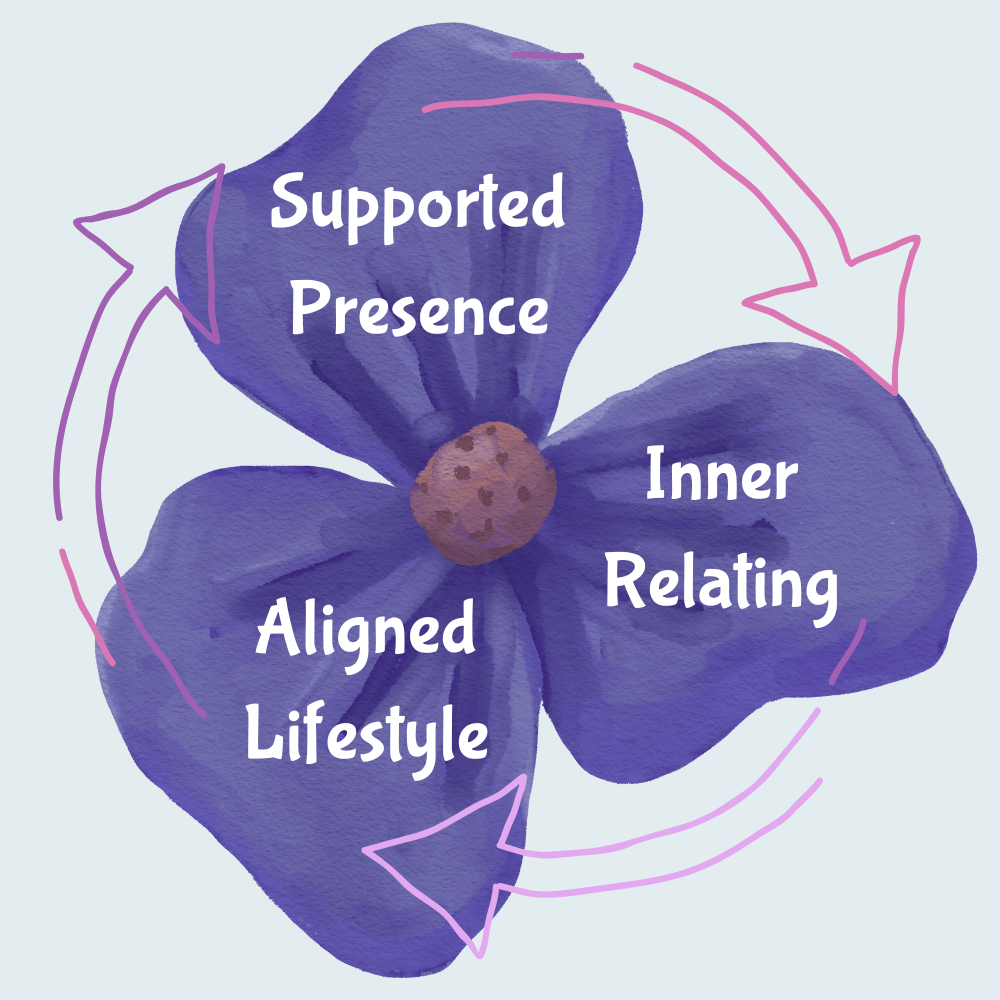You’ve probably tried everything to shift your junk food
addiction: intuitive eating, intermittent fasting, tracking, and countless broken food rules. Maybe you’ve even tried a food-based Twelve Step program or Eating Disorder Treatment.
And all you’ve gotten for your hard work is stronger cravings and more frustration when those approaches didn’t work.
Cravings themselves aren’t the problem. They’re signals pointing to unmet needs and emotions your body is trying to navigate. At the same time, ultra-processed foods are designed to hijack your cravings and make it hard to make healthy choices.
My approach is unique because it works with both: we pay attention to your feelings and patterns while gradually changing your food habits, moving step by step until your eating choices reflect your own personal goals.
The SPIRAL Process is a compassionate and empowering way to shift your food habits.

It works with your body’s inner wisdom to shift the roots of your addiction and reconnect you with a felt sense of aliveness.
It guides you along a peaceful, flexible path that is uniquely your own, so your food choices are aligned with your values, not someone else’s.
SPIRAL: Supported Presence – Inner Relating – Aligned Lifestyle
- Supported Presence: finding calm and grounded connection within yourself, so you can notice what’s happening without being overwhelmed.
- Inner Relating: listening with patience to the multiple, conflicted parts of yourself, and processing the feelings & beliefs that drive unwanted coping strategies.
- Aligned Lifestyle: making choices that reflect your goals and values; not just eating healthier, but building a life full of meaning & purpose.
- Process refers to the continual unfolding of life itself, where change happens gradually as you notice and integrate your experiences over time.
This approach is based on proven, powerful healing modalities that are used to treat trauma and substance addiction; and integrated into a system that’s easier to learn and build into your daily life.
The Three Phases of SPIRAL

This iterative process is like climbing a spiral staircase. You start out in the dark dungeon of active addiction, and eventually rise out into the light of a new freedom.
Along the way, you revisit each phase again and again, uncovering deeper insight, new self-awareness, and healthier choices with every turn.

While it may feel like going around in circles, each cycle allows you to meet your habits and cravings from a calmer, more grounded place.
One day, you wake up one day and realize cravings are no longer running your life!
Supported Presence
We start by helping you feel steady and calm in your body.
Simple nervous-system exercises support you in noticing your sensations, emotions, and impulses without getting swept away by them.
This phase builds inner safety, trust, and the ability to pause and feel what’s happening inside you.
Inner Relating
Next, you learn to relate to your inner experiences in a curious and compassionate way.
You’ll notice the felt-sense of the “parts” of yourself that drive cravings, urges, and self-criticism. With gentle guidance, you learn to talk to these parts as if they were separate voices inside you, listen to what they need, and respond with care.
This helps you loosen stuck patterns and understand the feelings behind your addiction.
Aligned Lifestyle
Finally, you take what you’ve learned and bring it into everyday life.
With a clearer sense of self and gentler inner relationships, you can make food choices from your own inner sense of what’s right for you, instead of following someone else’s script.
Practising small, mindful actions and better body awareness builds new habits that feel natural, freeing, and aligned with the life you want to live.
We Go Slow to Go Fast
This work isn’t about quick fixes; it is about building a solid foundation of inner safety and trust. We focus on going slow to reach the root of addictive patterns, rather than just treating symptoms.
While it may feel like you’re not moving at first, each small step inward is a powerful leap forward in building new habits. This gentle, mindful pace allows for deep, lasting change that serves you for life.
Can You Do This Alone?
The short answer is: sometimes. I did parts of my healing on my own, and it helped me hear my own voice.
But there were also times when going solo slowed me down, because I did not yet have the capacity to stay with the hard feelings that came up.
I truly believe I had more relapses and took a longer time to get recovery, than I would have if I’d been humble enough to admit I needed help.
Recovery is not about sheer willpower or pushing through. It is about learning to be present with cravings, emotions, and the parts of you that want different things. Doing that alone can be risky.
Without support, it is easy to get overwhelmed, shut down, or slip back into the old patterns you are trying to change.
That is why, whether you work with me or with someone else, it matters to have the right kind of support. Here are two places where DIY usually makes things harder:
- Co-regulation: Safe nervous system support
- Cravings often protect you from overwhelming feelings. When you finally turn toward those feelings, they can feel big, messy, or even unbearable.
- On your own, that can tip you into shutdown or collapse, which just strengthens the old craving–indulging loop. With a guide, your nervous system borrows steadiness from theirs.
- That grounded presence makes it safe to face what you’ve been avoiding — and lets your system learn new pathways instead of repeating the old ones.
- Part-awareness: Catching the identification
- When you’re in it, it’s almost impossible to see the difference between you and your parts. You say “I want junk food” and “I want to be healthy” as if both are your true voice.
- That inner battle is exhausting. Knowing conceptually that these are parts is one thing; noticing them as parts while they’re happening is another.
- You need someone skilled at gently pointing this out, so you can begin saying: “Something in me wants junk food. Something in me wants health.” That little shift is huge — it gives you space to relate to the parts instead of being run by them.
By the Time People Find Me…
Most people who come to me have already tried really hard to get free from junk food. They’ve done diets, meal plans, willpower challenges, tracking apps, exercise regimens, even recovery programs. They’ve read the books, joined the groups, followed the podcasts. None of this is for lack of effort.
And none of this is failure on your part. It’s the natural outcome of trying to fight an addiction that’s been engineered by one of the most corrupt and predatory industries on the planet. Junk food is designed to override your brain’s survival wiring. Of course it feels hard to quit!
The truth is, many of the programs you’ve tried are well-meaning and even a perfect fit for some people. They’re not wrong. They just might not work for everyone, no matter how much effort you pour in.
- Diets and challenges give you a burst of control at first, but sooner or later cravings come roaring back.
- 12 Steps programs like OA, FA, or Bright Line Eating provide structure and community, but often frame you as powerless and dependent on rigid rules for life.
- ARC: Food Addiction Reset does a beautiful job de-shaming food addiction and offering practical strategies, but it stays mostly rational and behavioural, without giving enough space for the emotional roots of the patterns.
- Brain Over Binge, Rational Recovery, and SMART Recovery are accessible and empowering for many, but lean heavily on a rational, top-down approach. For a lot of people, that still leaves the underlying emotional pain unaddressed.
- Eating disorder treatment can be life-saving for many, but if you’ve been through that system, you may also have experienced dismissal or invalidation of your own sense of what was true for you. I hear this a lot. Not always — there are excellent professionals out there — but often enough that people leave those programs reluctant to trust another professional again.
So if you’ve tried all of this and still feel stuck, please know it’s not because you’re broken or lazy or hopeless. You’ve been up against an addictive product and a one-size-fits-all system of solutions. It makes sense that you’re still searching.
What I offer is another way. One that doesn’t pit you against yourself, but helps you build safety, awareness, and alignment from the inside out.
The SPIRAL Process is based on these well-established practices and healing modalities:
- Nervous System Regulation: Lasting change starts with cultivating a sense of safety in the body.
- Focusing: A gentle, felt-sense parts work practice that helps you listen to the wisdom of your body.
- Nūma Breathwork: A powerful, body-centred practice that helps you access and release deeply held emotional tension.
I also teach from these evidence-based paradigms:
- Neurobiology of Craving: The dopamine system is the brain’s natural reward pathway.
- When you eat something pleasurable, your brain releases a hit of dopamine, telling you to do that again. This is a normal, healthy process.
- However, highly processed foods are engineered to deliver a dopamine hit far greater than anything found in nature.
- Your brain, in an attempt to maintain balance, pushes back by reducing its natural dopamine receptors. This creates a tolerance, so you need more of the food just to feel normal.
- By understanding this process, you realize it’s not a moral failing; it’s a hijacked biological system.
- Learning model of Addiction: Addiction is not a disease or a genetic condition you’re born with; like any habit, it’s a behavioural pattern that is learned over time.
- It starts as a simple, powerful response to a specific trigger, like feeling sad, stressed, or bored. Your brain learns that highly processed food is a reliable way to get a quick hit of comfort.
- The more you repeat these behaviours, the stronger these habits become.
- The good news? Every time you make a deliberate choice that aligns with your values and goals, you’re building healthier habits. Eventually these become the new pattern, and healthy eating becomes automatic.
- Gut Microbiology: Your gut is home to trillions of microorganisms, and they have a powerful influence over your cravings.
- When you regularly consume highly processed foods, you feed the bacteria that thrive on sugar and refined carbohydrates.
- These bacteria “hijack” your craving system, sending signals to your brain that demand more of the foods they want to eat.
- As your eating improves, you increase the diversity of your gut and starve out the hijackers, sending new signals to your brain that support your health and well-being.
- Food Industry: In the 1980s, Big Tobacco took over the processed food industry.
- They brought their whole arsenal of chemical engineering and deceptive marketing. Using decades of research on habit formation, they learned how to create food products that are as addictive as possible.
- They engineer “bliss points”, which are perfect combinations of fat, sugar, and salt that bypass your body’s natural satiety signals.
- By understanding these powerful tactics, you realize it’s not a lack of willpower that you’re up against, but a multi-billion dollar industry that is literally working against your best interest.
These lenses inform my worldview:
Attachment Theory: This framework helps us understand how our early relationships may have shaped our nervous system and created our current coping mechanisms. This work is about building a secure, compassionate relationship with yourself, so your body no longer needs to use food to find a sense of safety and connection.
Integral Theory: This model helps us understand how individuals evolve and grow. I use this lens to meet you exactly where you are on your unique healing journey, honoring your current worldview without judgment. It helps us find the most effective tools to support your next step.
Tantric Philosophy: Tantra is about embracing all of life’s experiences, from cravings and pain to joy and bliss, with presence and awareness. This philosophy informs my approach of mindfully turning toward your inner world rather than fighting it, trusting that your body’s wisdom holds the key to your freedom.
Spirituality: I believe there’s a deep connection between having a spiritual practice and living a meaningful life. This lens informs my focus on helping you find a deep sense of meaning, purpose, and connection to something larger than yourself. As you do, you’ll naturally find less and less need to seek fulfillment through food.
